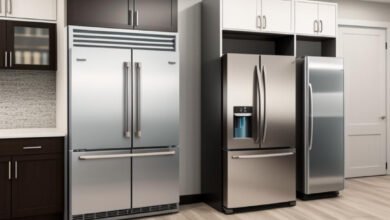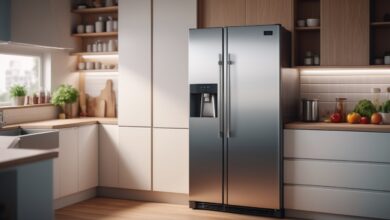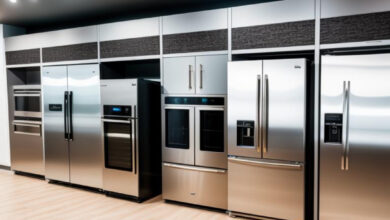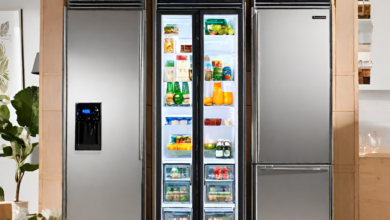Maximizing Longevity: Efficient Ways to Prolong Refrigerator Life

The refrigerator is an indispensable appliance in every household, working tirelessly to preserve our perishables and keep our food fresh. Given its central role in the kitchen, it’s crucial to ensure that your refrigerator operates efficiently and has a prolonged lifespan. In this detailed blog, we will explore a variety of strategies and tips to maximize the longevity of your refrigerator, covering everything from proper maintenance and temperature management to energy-saving practices.
I. Optimal Temperature Management
1.1 Setting the Right Temperature
Maintaining the correct temperature inside your refrigerator is fundamental to its efficiency and longevity. The recommended temperature range for the refrigerator compartment is between 35°F and 38°F (1.7°C and 3.3°C). Freezer compartments should be set at 0°F (-17.8°C). Avoid extremely low temperatures, as they can lead to unnecessary energy consumption without providing additional benefits.
1.2 Using Thermometers
Investing in a refrigerator and freezer thermometer is a simple yet effective way to ensure that your appliance is consistently operating at the desired temperatures. Regularly check and adjust the settings if needed, especially after cleaning or defrosting.
II. Regular Cleaning and Maintenance
2.1 Cleaning Condenser Coils
Condenser coils play a crucial role in dissipating heat from the refrigerator. Over time, these coils can accumulate dust and debris, reducing their efficiency. Regularly vacuum or brush the coils to ensure optimal heat exchange and prevent the compressor from overworking.
2.2 Cleaning Door Seals
Properly functioning door seals are essential for maintaining the internal temperature of the refrigerator. Wipe down the door gaskets regularly with a mild detergent to remove any dirt or residue. Check for signs of wear, and if the seals are damaged, consider replacing them to prevent cold air leaks.
2.3 Defrosting the Freezer
For refrigerators with manual defrosting freezers, it’s essential to periodically defrost them. Ice buildup not only reduces the efficiency of the freezer but also increases energy consumption. Follow the manufacturer’s recommendations for defrosting frequency to keep your refrigerator running smoothly.
III. Efficient Organization and Air Circulation
3.1 Proper Food Placement
Organize the contents of your refrigerator thoughtfully. Avoid overcrowding, as it can obstruct the airflow and force the compressor to work harder. Allow sufficient space between items for optimal air circulation, ensuring uniform cooling throughout the appliance.
3.2 Using Refrigerator Drawers
Most refrigerators come equipped with specialized drawers for fruits, vegetables, and deli items. Utilize these drawers to maintain the freshness of different food categories. Adjust the humidity levels in the drawers according to the type of produce stored, as this helps to preserve their quality.
3.3 Avoiding Blocking Ventilation
Refrigerators have built-in ventilation systems to ensure proper airflow. Ensure that vents in the refrigerator and freezer compartments are not blocked by food items or containers. Unrestricted airflow contributes to consistent cooling and reduces strain on the compressor.
IV. Energy-Saving Practices
4.1 Energy-Efficient Models
If you’re in the market for a new refrigerator, consider investing in an energy-efficient model. Energy Star-rated appliances adhere to strict energy efficiency standards, providing long-term cost savings on electricity bills and reducing environmental impact.
4.2 Closing the Doors Promptly
Minimize the time your refrigerator doors are open to prevent cold air from escaping. Ensure that doors are tightly closed after each use. If you have children, educate them about the importance of closing the refrigerator doors promptly.
4.3 Location Matters
The placement of your refrigerator can impact its energy efficiency. Keep it away from direct sunlight and heat-producing appliances like ovens and dishwashers. Adequate ventilation around the appliance helps it operate more efficiently.
V. Monitoring and Addressing Issues Promptly
5.1 Regular Checkups
Periodically inspect your refrigerator for signs of wear, tear, or malfunction. Check for water leaks, unusual noises, or temperature fluctuations. Prompt identification of issues allows for timely repairs, preventing minor problems from escalating into major repairs.
5.2 Addressing Strange Noises
Unusual noises, such as grinding or clicking sounds, may indicate underlying issues with the compressor, condenser fan, or other components. If you notice any strange noises, consult the refrigerator’s user manual or seek professional assistance to address the problem promptly.
VI. Extending the Lifespan of Components
6.1 Replacing Water Filters
If your refrigerator has a water dispenser or ice maker, replace the water filter at the recommended intervals. This not only ensures the quality of water and ice but also prevents clogs and strain on the water supply system.
6.2 Inspecting and Replacing Gaskets
The gaskets, or seals, on the refrigerator and freezer doors play a crucial role in maintaining the internal temperature. Regularly inspect these gaskets for wear or damage. If you notice any issues, replace them promptly to prevent energy waste and temperature fluctuations.
VII. Environment Considerations
7.1 Avoiding Overcooling
Refrigerators operate most efficiently when they maintain a consistent temperature. Avoid overcooling by setting the thermostat to the manufacturer’s recommended temperature range. Extremely low temperatures not only waste energy but can also impact the freshness of certain foods.
7.2 Climate Considerations
Consider the climate in your region when setting up and operating your refrigerator. In humid climates, you may need to use a dehumidifier in the refrigerator to prevent excess moisture, while in drier climates, additional moisture may be necessary to maintain optimal food freshness.
VIII. Upgrading and Recycling
8.1 Knowing When to Upgrade
While proper maintenance can significantly extend the life of your refrigerator, there comes a point when upgrading to a newer, more energy-efficient model is a wise decision. Modern appliances often come with advanced features and improved energy efficiency, providing long-term benefits.
8.2 Responsible Disposal and Recycling
When it’s time to replace your refrigerator, opt for responsible disposal and recycling. Many appliance retailers and manufacturers offer recycling programs, ensuring that old appliances are properly dismantled and disposed of in an environmentally friendly manner.
IX. Conclusion
In conclusion, the longevity of your refrigerator is not solely dependent on its brand or model but also on how well you maintain and care for it. By implementing the efficient ways discussed in this detailed blog, you can extend the lifespan of your refrigerator, reduce energy consumption, and save on potential repair costs. A well-maintained refrigerator not only ensures the freshness of your food but also contributes to a more sustainable and cost-effective household. Incorporate these tips into your routine, and your refrigerator will continue to serve you efficiently for years to come.






